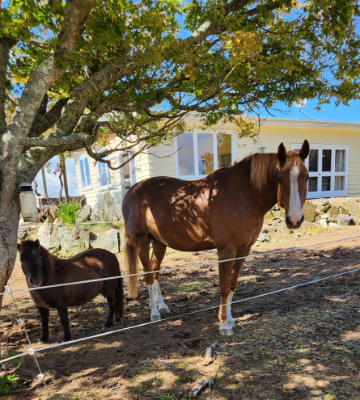Last year I removed my horse from the grass to try and resolve some weird issues he was having. These are the things I have learnt about having horses off grass. Removing a horse from grass seems to be something that is recommended, in my opinion, far to quickly. It was an absolute last resort for me. Horses are designed to eat grass, not live not eating it but unfortunately that doesn't work for every horse. Having a horse off grass involves a lot more work and its very expensive so consider carefully if this is right for your horse. This is MY experience and should not replace qualified expert advice. If you are taking your horse off the grass, please consider talking to a qualified nutritionist to make sure you have all their nutritional needs covered. It is NOT just a matter of not feeding them grass. You need to replace what they would be getting from the grass.
Horses MUST have continuous access to appropriate fibre. This was probably the biggest lesson I have learnt. My horse is the type that always needs his weight watching. Unfortunately, I was taught the way to do that was to restrict how much food he ate. This is NEVER how you should control a horses weight. I didn’t know any better😞 It is very detrimental to their gut health and mental health. Horses are grazes and graze 18 – 20 hours in a 24 hour period. Giving him 24/7 access to fibre was something I really struggled with. If I let him eat all the time, he’d get really fat and that would make him really sick. The key is having continuous access to the RIGHT fibre. I.e. hay or long, dry, brown stalky grass. If I put my horse, given his type, in a paddock of green grass and let him eat as much as he wants all the time, yes he would get very fat and very sick however with 24/7 access to the RIGHT fibre, that didn't happen. Horses will self-regulate eventually. If you’d told me my horse would self-regulate how much he ate, I would have said rubbish, he’ll eat until he pops. It wasn’t until I had no choice that I tried it. He ate his head off (hay) for 9 weeks. He’d had food restricted to control his weight pretty much his whole life, so it took a long time for him to realise the food wasn’t going away so he didn’t need to eat because it was in front of him. Yes he put on weight initially. He has since lost that on his own as he’s not eating his head off now. He is still a bit fat, not dangerously so, but that is to be expected given he has been out of work for 18 months and I can’t use exercise to remove that weight as he is not rideable at the moment. Once I can ride again, I will be able to remove that weight no trouble at all.
Now he has 24/7 access to hay. He has his hay in a slow feed hay net, 4cm holes, not those awful teeny tiny hole ones. He can still get mouthfuls and chew. The saliva created by chewing is important to gut health. The hay net slows him down just a bit so he feels full quicker and stops eating rather than over eating a bit till he realises he’s full. Prevents a huge amount of hay wastage as well!! The difference in his mental state is incredible. He spends time eating then will rest and sleep, not continuously look for food. He’s not always trying to snatch grass when I’m leading him or doing something with him. He is very content. His stomach is working properly so has lost that potty gelding tummy look. He’s not continuously looking for ways to break out of the paddock. I don’t even have the fences on during the day anymore. He’s not a racing around idiot at breakfast and dinner time. He is much, much happier. If my horse can self-regulate what he eats, any horse can. Having 24/7 access to the right fibre being the right approach is also evidenced by his mini friend who he lives with. He is on exactly the same regime, has not got excessively fat or become unwell, is much happier, and the same behaviour changes have been observed.
If you take a horse off grass, you need to supplement them with vitamin E and give them another source of protein. They get vitamin E from grass so if they are not getting grass, they need an alternative source. Crushed linseed and/or black sunflower seeds are good options. Mine has both. Both of these feeds have other benefits as well including being a good source of protein. If you are crushing linseed, buy whole linseed then crush right before you feed. A small coffee grinder is ideal. If you are unsure about what might be right for your horse, please consult a qualified nutritionist for guidance.
Lime is your friend. Without grass to deal with wee, where they wee can get smelly and yuck. Chuck lime on it to deal with the ammonia.
The grass seed from the hay will sprout. Ideally, if you can have two areas, you can move them from one to the other and spray any grass that has sprouted from the area they have just come out of. If you can’t do that, coarse ag salt on the sprouting grass will kill it. You need to use a fair bit and keep doing it. We use the levelling bar behind the tractor to smooth everything out every month or so, the area will get quite cut up. This also removes any sprouted grass.
Dirt will turn to mud quick smart when it rains. You need to think about a plan B for continuous wet weather. There are lots of options for creating a surface. Google has some fab ideas. Mine go out onto the cattle race when it’s really wet. They have a square into a paddock for sleeping and rolling as the race is a bit harder than I’d like but it gets them out of the mud. This is kept sprayed to make sure it is grass free if they need to use it.
Your horse MUST have room to move. A track system works well. You don’t need a huge amount of room, as long as there is a circuit. My horse is on the lawn! Yes, it is a fairly big lawn but by no means a paddock. Like being in the paddock, they also need access to shelter and shade.
Mucking out twice daily is needed There is no grass to stop the poo from being trampled into the dirt. If there is no grass and poo gets walked on, it gets trampled into the dirt and is really hard to pick up. Your horse is likely in a smaller area than a paddock so it’s a must to keep it clean.
Your horse will drink a lot more water. Something to be aware of when you’re out riding, travelling or don’t have self filling troughs.


